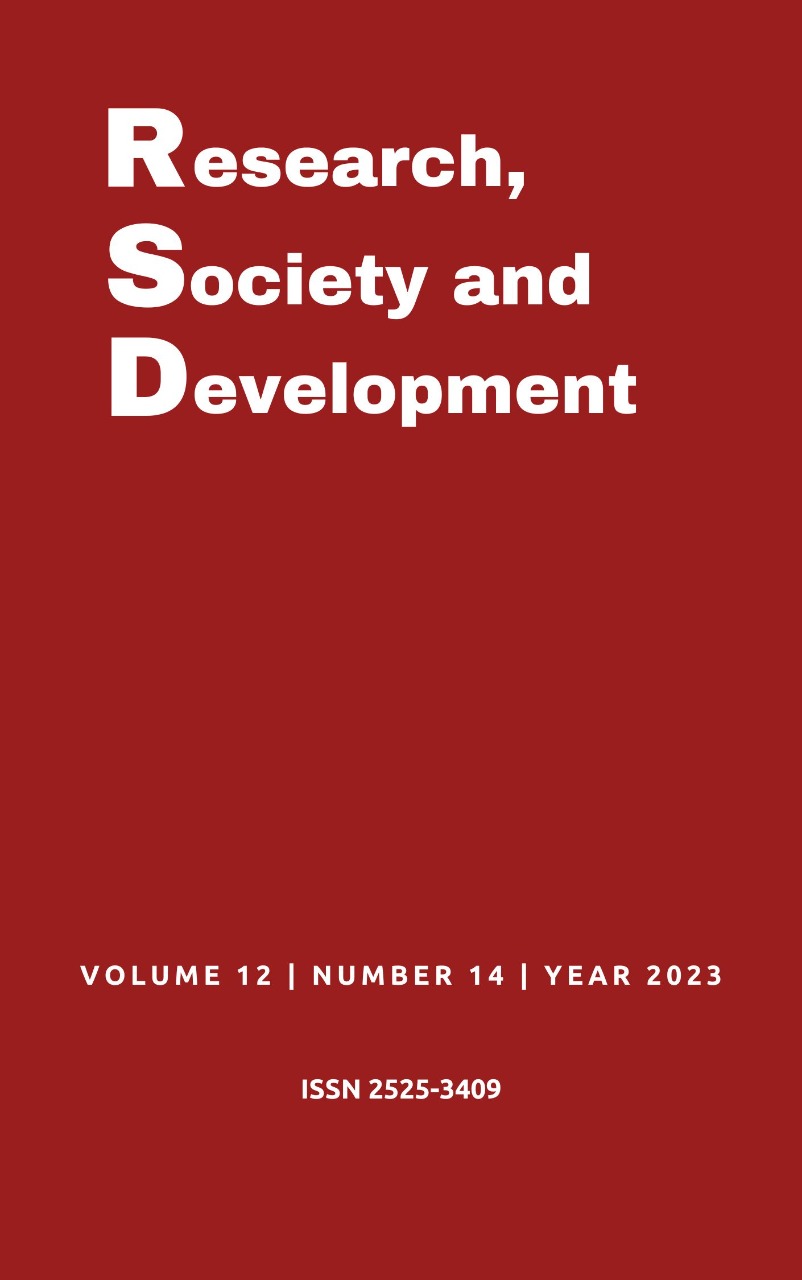Bibliographic analysis on the power of music: A neurochemical perspective
DOI:
https://doi.org/10.33448/rsd-v12i14.44408Keywords:
Music therapy, Mental health, Music, Promoting well-being.Abstract
Introduction: Music acts on specific areas of the brain, stimulating its plasticity, bringing numerous contributions in various situations, such as, for example, reducing anxiety, stress levels, increasing cognitive, intellectual, spatial abilities, among others. The general objective of this study is to understand the benefits provided by music in promoting health due to its neurochemical effects. Methodology: a literature review was carried out that allowed the search for articles published in the last ten years, by Brazilian and foreign researchers, in the Pubmed and Google Scholar databases. Results and discussion: The data obtained allowed us to verify that music therapy, carried out by specialized professionals, helps patients with different health/disease conditions to improve their physical, intellectual, emotional and social conditions due to the musical stimuli received. Considerations: The stimuli from music act on the brain and its plasticity, culminating in positive effects, whether in the treatment of people with anxiety, depression, who need to go through the neuro rehabilitation process, elderly people who are suffering from a lack of memory, among other conditions. It also helps healthcare professionals work with more motivation, providing more humanized care to the patients they serve.
References
Batalha, J. R. (2022). Musicoterapia e seus efeitos no ambiente hospitalar. Research, Society and Development. 11, 1-8 http://dx.doi.org/10.33448/rsd-v11i6.26747 https://www.researchgate.net/publication/360152046_Musicoterapia_e_seus_efeitos_no_ambiente_hospitalar
Correira, C. M. (2023). Musicoterapia neurológica: o que isso tem a ver com linguagem? Estudos da língua (GEM). 21(1), 489-493 http://dx.doi.org/10.22481/el.v21i1.13388
Costa, L. F. (2016). Ação neuroprotetora da sonata de Mozart na aprendizagem e memória de ratos expostos à hipoxia cerebral. Programa de pós-graduação em ciências do comportamento, Universidade de Brasilia. http://www.realp.unb.br/jspui/bitstream/10482/21616/1/2016_LariceFeitosaCosta.pdf4
Ferreira, R. G. (2021). Musilinguagem e emoções - Pode a música evocar memórias coletivas de longa permanência? Policromias - Revista de estudos do discurso, imagem e som. (Vol. 6). https://revistas.ufrj.br/index.php/policromias/article/download/46548/26973
Filho, R. S. (2021). O uso da músicoterapia como prática integrativa e complementar de saúde em pacientes integrativos. Revisão Integrativa. https://periodicos.ufrn.br/casoseconsultoria/article/view/26853
Júnior, J. D. (2019). Música, saúde e bem-estar: aulas de música e habilidades cognitivas não musicais. Revista da ABEM. (Vol. 27)https://revistaabem.abem.mus.br/index.php/revistaabem/article/download/798/541
Kirkham, E. (2014). How does the brain process rhythm? Elife. https://doi.org/10.7554/elife.02658.
Muszkat, M. (2012). Neurociência e Desenvolvimento Humano. Ministério da Cultura e Vale. https://amusicanaescola.com.br/blocos/musica-neurociencia-e-desenvolvimento-humano/
Jiménez-Palomares, M., et al. (2013) Beneficios de la musicoterapia como tratamiento no farmacológico y de rehabilitación en la demencia moderada. Revista Española de Geriatría y Gerontología. 48(5),238-242.
Ribeiro, M. C. (2018). Aplicabilidade da musicoterapia nas complicações neurológicas decorrentes da hipóxia isquêmica encefálica, induzida experimentalmente por nitrito de sódio. Brasilia, DF: Programa de Pós-Graduação em Ciências Médicas da Faculdade de Brasilia. 32, 1-2 https://doi.org/10.1016/j.nrl.2014.11.001 https://pubmed.ncbi.nlm.nih.gov/25553932/
Rocha, V. G., & Boggio, P. S. (2013). A música por uma óptica neurocientífica. Per Musi. https://doi.org/10.1590/S1517-75992013000100012
Santee, K. M. (2019). O uso da música nos serviços de saúde. Journal of Nursing and Health. P. (Vol. 9). https://doi.org/10.15210/jonah.v9i2.14432. https://pesquisa.bvsalud.org/portal/resource/pt/biblio-1047270
Schlaug, G., Marchina, S., & Norton, A. (2008). Singing To Speaking: Why Singing May Lead To Recovery Of Expressive Language Function In Patients With Brocas Aphasia. Music Perception. An Interdisciplinary Journal. 25. https://doi.org/10.1525/mp.2008.25.4.315
Silva, A. P. (2020). Efeitos da música clássica aplicadas em crianças hospitalizadas. Revista Eletrônica Acervo Saúde. 48, e3215 http://dx.doi.org/10.25248/reas.e3215.2020
Silva, M. (2017). Musicalidade em relação ao estresse, uma análise de aprendizagem: Ciência Desenvolvimento - Revista Eletrônica da FAINOR. 10, 2-9 http://dx.doi.org/10.31692/2358-9728.IVCOINTERPDVL.2017.00164
Souza, J. B. (2020). Interface entre a música e a promoção da saúde da mulher: Revista Brasileira em Promoção da Saúde. 33, 2-5 https://doi.org/10.5020/18061230.2019.9466 https://search.bvsalud.org/portal/resource/pt/biblio-1117639
Thaut, M., & Hömberg, V. (2016). Handbook of neurologic music therapy. Oxford: Oxford University Pres (Semantic Scholaar) 2-5 https://www.semanticscholar.org/paper/Handbook-of-neurologic-music-therapy-Thaut-H%C3%B6mberg/9beb99fbcdc6415dc2b7236e0bf4cbc684e06c52
Overy, K., & Molnar-Szakacs, I. (2009). Being Together in Time: Musical Experience and the Mirror Neuron System. Music Perception 26(5) https://psycnet.apa.org/doi/10.1525/mp.2009.26.5.489
Zagmignan, E. V. (2021). Uso da música como recurso terapeutico no desenvolvimento cognitivo em idosos. Revista de casos e consultoria. 12(1), https://periodicos.ufrn.br/casoseconsultoria/article/view/27325
Franzoi, M. A. H. (2022). Musicoterapia voltada a pacientes com Covid 19:uma revisão de escopo. Research, Society and Development, 11(13). http://dx.doi.org/10.33448/rsd-v11i13.34872
Miriã, D. C, Juliane, P. A, Keli, R., Gislaine, M. M., & Adriana, V. Z (2022). Musicoterapia para crianças e adolescentes elegíveis para cuidados paliativos: revisão integrativa. Research, Society and Development. 11(12). http://dx.doi.org/10.33448/rsd-v11i12.34707
Downloads
Published
Issue
Section
License
Copyright (c) 2023 Pâmela Vargas do Carmo; Jean Colacite

This work is licensed under a Creative Commons Attribution 4.0 International License.
Authors who publish with this journal agree to the following terms:
1) Authors retain copyright and grant the journal right of first publication with the work simultaneously licensed under a Creative Commons Attribution License that allows others to share the work with an acknowledgement of the work's authorship and initial publication in this journal.
2) Authors are able to enter into separate, additional contractual arrangements for the non-exclusive distribution of the journal's published version of the work (e.g., post it to an institutional repository or publish it in a book), with an acknowledgement of its initial publication in this journal.
3) Authors are permitted and encouraged to post their work online (e.g., in institutional repositories or on their website) prior to and during the submission process, as it can lead to productive exchanges, as well as earlier and greater citation of published work.


